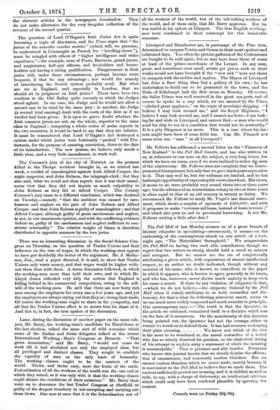The question of Lord O'Hagan's Irish Juries Act is again
becoming a topic of discussion, and the Times urges that " the jurors of the nouvelles couches sociales " (which will, we presume, be understood in Connaught as French for " levelling-down "), must be mingled with others of " higher intelligence and wider experience,"—for example, sons of Peers, Baronets, grand jurors, and magistrates, half-pay officers, and freeholders and house- holders not having a rating qualification. Disagreement in Irish juries will, under these circumstances, perhaps become more frequent, if that be any advantage ; nor would the remedy of introducing the Scotch system probably avail. But what are we in England, and especially in London, that we ethould sit in judgment on Irish juries ? There have been two verdicts at the Old Bailey quite recently at which the Judges .stood aghast. In one case, the Judge said he would not allow a second case to be tried by the same jury ; in another, the Judge (a second trial ensuing) dealt with the costs of the first as if no verdict had been given. It is open to grave doubt whether the "Irish common jurors are not, on the whole, superior to the same glass in England ; comparing a whole series of assize reports in the two countries, it would be hard to say that they are inferior. It must be remembered that Lord O'Hagan's Act destroyed a Aystem under which juries were habitually " packed " with Pro- testants, for the purpose of ensuring conviction, down to the date of its introduction. The new system, we believe, only needs a little time, and a very little amendment, to work well.


































 Previous page
Previous page